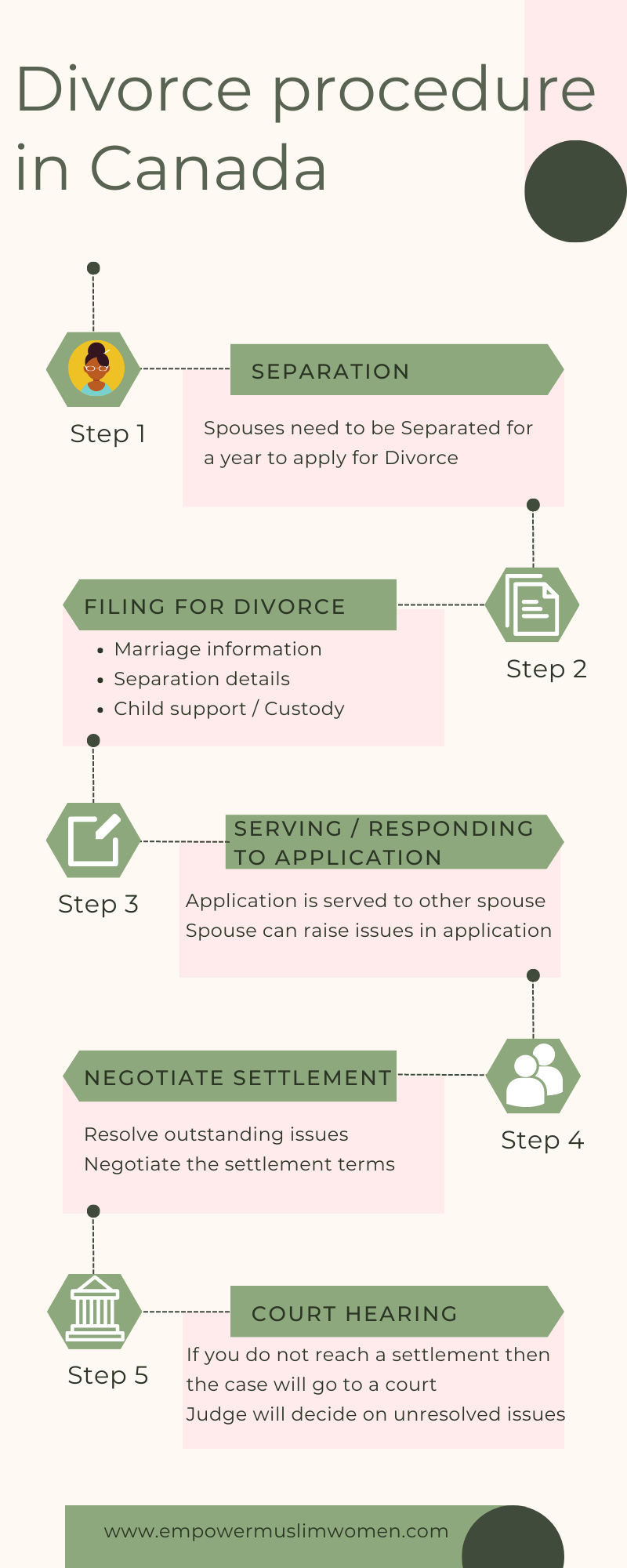Legal Divorce Process in Canada
Posted on April 13, 2023 • 4 minutes • 710 words
Marriage is a sacred union in Islam and divorce is considered a last resort. However, there may be instances where divorce is the best option for a Muslim couple. In Canada, Muslim couples have the legal right to seek a divorce through the courts, and the process is similar to that of non-Muslim couples.
This article will provide a detailed guide on how Muslim couples can get a legal divorce in Canada.
Grounds for Divorce
In Canada, there are three grounds for divorce: adultery, cruelty, and separation. Adultery is defined as one spouse having sexual relations with someone other than their spouse. Cruelty is defined as physical or mental harm caused by one spouse to the other, making it impossible for them to continue living together. Separation occurs when a couple has lived apart for at least one year, and there is no chance of reconciliation.
Islamic law also recognizes several grounds for divorce, including irreconcilable differences, cruelty, adultery, and abandonment. If a couple is seeking a divorce in Canada, they must satisfy the legal grounds for divorce as well as any religious requirements.
Divorce Process
The divorce process in Canada involves several steps, including filing an application for divorce, serving the other spouse with the application, and attending court hearings.
Filing the Application: To file for divorce, a Muslim couple must complete an application for divorce form, which is available at the local family court or online. The form requires personal information about both spouses, including their names, addresses, and dates of birth. It also requires information about the grounds for divorce and any arrangements for children, property, and support.
Serving the Other Spouse: Once the application for divorce is filed, the other spouse must be served with a copy of the application. This can be done through a process server, by registered mail, or by personal delivery. The other spouse has 30 days to respond to the application.
Responding to the application: The other spouse can respond to the application and raise any issues they want to address, such as property division or spousal support
Negotiating a Settlement: The spouses may negotiate a settlement agreement to resolve any outstanding issues.
Court Hearings: If the other spouse agrees to the divorce, the process can be relatively straightforward. However, if there are disputes over issues such as child custody, support, or property division, the divorce process can become more complicated.In such cases, the couple may need to attend court hearings to resolve these issues. A judge will consider the evidence presented by both spouses and make a decision based on the best interests of any children involved and the principles of fairness and equity.

Religious Considerations
Muslim couples may also have religious considerations to take into account when seeking a divorce in Canada. While Canadian courts do not consider religious law in their decisions, a Muslim couple may choose to seek a divorce according to Islamic law.
Islamic law recognizes two types of divorce: Talaq and Khula.
Talaq is a form of divorce initiated by the husband. The husband must declare his intention to divorce his wife orally or in writing, and the divorce takes effect immediately. However, there are conditions for Talaq to be valid in Islamic law, such as the presence of witnesses and a waiting period.
Khula is a form of divorce initiated by the wife. In this case, the wife must request a divorce from her husband and offer him compensation, such as money or property. If the husband agrees to the compensation, the divorce can proceed.
While Talaq and Khula are recognized under Islamic law, they are not recognized under Canadian law. Muslim couples seeking a divorce in Canada must go through the legal process outlined above, regardless of their religious beliefs.
Conclusion
In Canada, Muslim couples have the legal right to seek a divorce through the courts, and the process is similar to that of non-Muslim couples. Muslim couples must satisfy the legal grounds for divorce, which include adultery, cruelty, and separation. Muslim couples can also use Islamic dispute resolution mechanisms, such as arbitration or mediation, to resolve issues related to divorce. These mechanisms must be in compliance with Canadian law and any agreements reached through these mechanisms must be recognized by Canadian courts.
